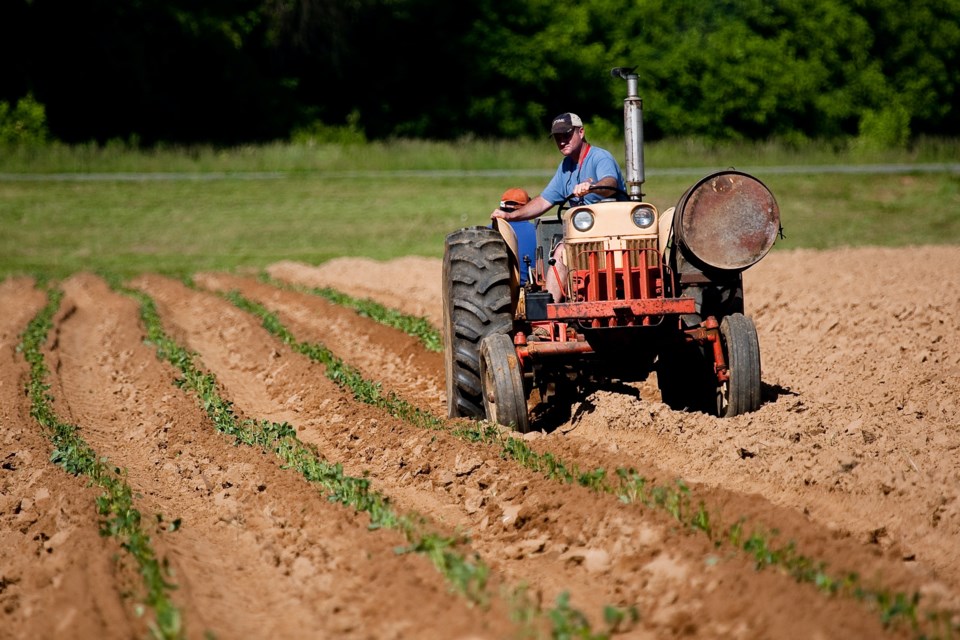Climate change. Inclement weather. Market fluctuations. The pressures faced by Ontario’s farmers are mounting, and they’re having a detrimental impact on producers’ mental health.
Associates with the Canadian Mental Health Association (CMHA) gathered to speak about challenges faced by farmers — and the help that’s available to them — during a July 17 webinar jointly hosted by Ignatius Farm, Everdale, the Ecological Farmers Association of Ontario, and National Farmers Union – Ontario.
Bethany Parkinson, a registered social worker who helps train people in the ag industry in suicide prevention, laid out the most recent statistics on farmer mental health.
In a 2016 study, University of Guelph researcher Andria Jones-Bitton found that 35 per cent of farmers meet the classification for depression, while 58 per cent meet the classification for anxiety, and 45 per cent report experiencing high stress.
Five years later, in an update to that study, things hadn’t improved.
The 2021 numbers showed that suicide ideation — having thoughts about ending your life — was two times higher in farmers than in the general population, and a quarter of Canadian farmers felt life was not worth living, wished they were dead, or had thought of taking their own life within the past 12 months.
Additionally, the practice of using alcohol as a coping mechanism was found to be significantly higher in farmers than in the general population.
“Farming is more than just 9-to-5 job or a business; it's a lifestyle, too, that can impact individuals but also their family,” said Parkinson, the psychological support coordinator and trainer for the Guardian Network.
“Weather has an impact, climate has an impact, as well as many things associated that can definitely lead to stress.”
Registered psychotherapist Marnie Wood, who is the program manager for the Guardian Network, said that high amounts of stress over the long term can be harmful to a farmer’s health. That includes physical ailments, such as obesity, heart disease and high blood pressure, and mental disorders, such as dementia and an increased risk of mental illness.
In the Jones-Bitton study, signs of burnout — emotional exhaustion, cynicism — were high in farmers, but they also reported feeling confident in being able to competently get their work done, Wood added.
“This observation of high emotional exhaustion and cynicism without low professional efficacy is likely indicative of participants being in a transitional state towards burnout,” Wood said.
Want to read more stories about business in the North? Subscribe to our newsletter.
Indeed, 12 per cent of farmers in the 2016 Jones-Bitton study reported feeling burned out, two per cent said they were disengaged, while 25 per cent said they were ineffective at their work, and 20 per cent said they were overextended.
Wood said the 2021 updated survey showed no major changes to those numbers.
Parkinson said it’s important for farmers to incorporate self-care into their daily lives to support their mental health and well-being.
This might include things like setting up a daily routine, exercising, and getting adequate amounts of sleep, as well as engaging in hobbies and building a support network.
Wood also gave some advice on how to support other farmers who might be struggling.
Show you care, she said, and lead any conversation with facts and observations rather than judgments. She encouraged the practice of “active listening” and respecting a person’s boundaries, while connecting them to help if needed.
“Recovery looks different for everyone,” she said, “and it doesn't happen overnight.”
A trio of programs for farmers is available through Agriculture Wellness Ontario, a five-year initiative sponsored by the federal and provincial and territorial governments, and administered by the Canadian Mental Health Association (CMHA).
Through the Farmer Wellness Initiative, producers can access a phone help line (1-866-267-6255), which is available 365 days a year, seven days a week, with services in both French and English.
In calling the number, farmers and their family members will enter the intake process to arrange for counselling services with a mental health professional, which are free of charge.
The Guardian Network is a suicide prevention network that supports Ontario’s farming community.
Volunteers in the ag sector are trained by the CMHA to recognize the signs of mental distress and how to connect farmers with the resources and support available locally to them. The program recruits people who visit the farm often, including sales representatives, veterinarians, agronomists, and technicians.
Finally, In the Know is a four-hour training program, delivered virtually or in person, that’s aimed at farmers, their families and others working in the sector.
It covers the topics of stress, depression, anxiety, substance use, and how to talk about mental well-being. The program is delivered by mental health professionals, using real-life examples from the agriculture sector.
